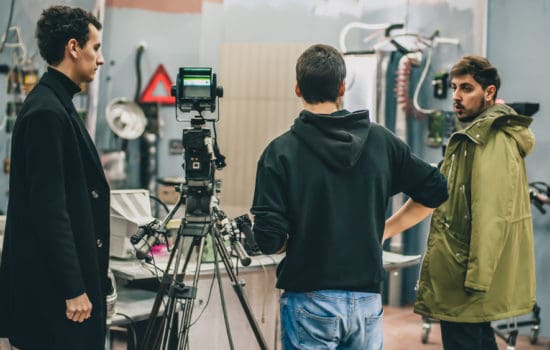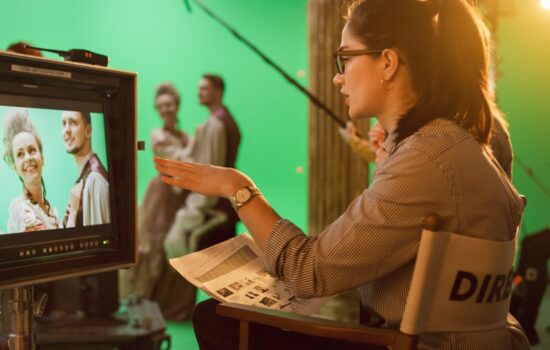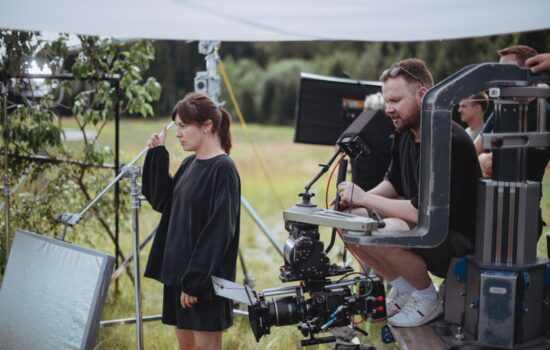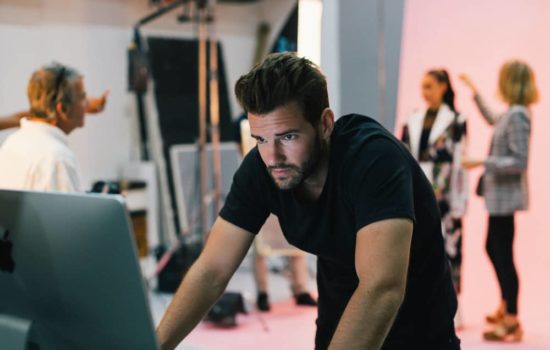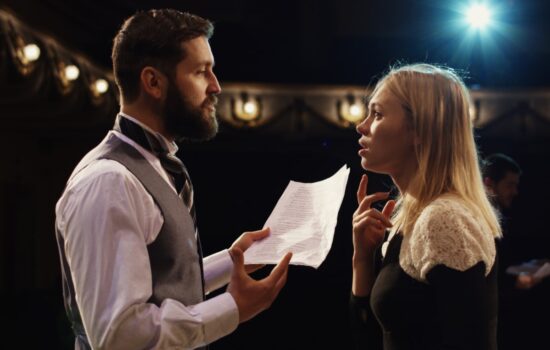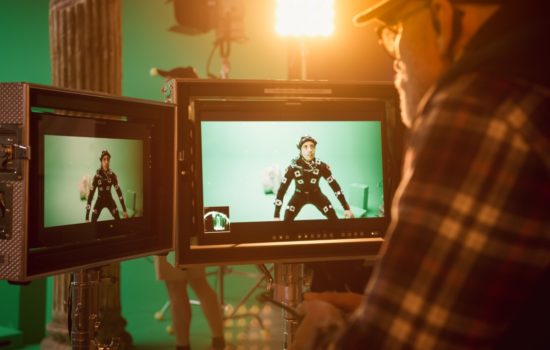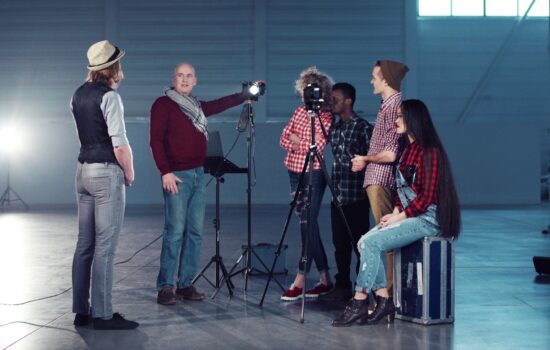Entertainment Lawyer
Career Overview
Entertainment Lawyers manage legal matters for studios, production companies, Producers, Directors, Screenwriters, Actors, and occasionally below-the-line crew. This includes contractual agreements, negotiations, advice, and counseling.
Alternate Titles
Entertainment Attorney
Avg. Salary
$117,5671
Salary Range
$77K – $186K1

How To Become an Entertainment Lawyer
People also ask
Career Description
When filmmaking or the entertainment industry is brought up, many people think of either the creation of a movie on set or the deals made for them at production companies and studios. But often what is overlooked is the essential contribution of Entertainment Lawyers in the production of any film, television show, or other entertainment medium.
Entertainment Lawyers help to ensure that all legal necessities and obligations are carried out as discussed, negotiated, and executed. And when any issues arise such as copyright infringement or a broken contract, it’s the Entertainment Attorney who will oversee and resolve it.
To get a firsthand perspective on the professional life of an Entertainment Attorney, we spoke with Entertainment Lawyer Samantha Herman about her career and insights she could provide to those interested in this sector of the entertainment business.
Samantha is also a Screenwriter, which gives her added awareness of her clients’ concerns and a keen understanding of how important Entertainment Lawyers are in every facet of filmmaking.
Herman states, “On the legal side, I am a business affairs consultant and production legal adviser. I primarily work with independent filmmakers and production companies, as well as start-ups. Sometimes the client needs an a la carte service, such as a singular contract drafted, or a new business entity registered. Recent examples include an option agreement to acquire rights in a screenplay and talent agreements for a short film.”
Early in your research on entertainment law? This video offers a comprehensive overview on the many facets of being an Entertainment Lawyer.
Though one-time client needs are common in her line of work, Herman notes that she often is involved with projects from start to finish. “I will work on the entire lifespan of a film, from A to Z, starting with the chain of title on the idea up to the distribution deal when the film is ready.
“Regardless of the scope or nature of the project, my general approach is to discuss what the client envisions for their agreement, identify questions or concerns that they haven’t considered, prepare a first draft of the contract, and tweak until we have achieved language that captures exactly what they want communicated.”
The film industry is rife with projects that fall apart at every part of the filmmaking process from pre-production even up to when a movie might be ready for distribution. For that reason, as optimistic as Herman might be for her clients and their projects, she must be the person to ask a lot of what ifs.
She notes, “Because I work mostly in the entertainment space, there tends to be a lot of excitement and enthusiasm when my clients are embarking on a new artistic endeavor — as there should be! But then I come in to make sure that if the project doesn’t go as planned, we can institute measures to deal with those ramifications.
“Also, because a contract doesn’t appear on-screen, sometimes the paperwork can be undervalued and deemed a boring afterthought. However, you can’t commercialize even the most artistically sound works without having the correct documentation in place. In answer to this actual question, there is no typical workday. Which is very exciting for me!”
All to say, the professional life of an Entertainment Lawyer involves being the person to make sure that their clients are legally protected in all regards and safeguarded in the event that any aspect of a project goes sideways.
What do Entertainment Lawyers do?
What many people may not realize is the sheer amount of legal paperwork required for films and other types of entertainment to be made. Enter Entertainment Lawyers. Entertainment Lawyers are the experts who ensure that all necessary contracts and other documents are correctly and thoroughly composed and completed for these projects. They may also be involved when there is a breach of contract or other legal issues that arise in relation to a production.
Salary
According to ZipRecruiter, the average annual salary of an Entertainment Lawyer in Los Angeles is $101,414 (as of this writing). The national average can range from $54,181 to $153,240.
When it comes to financial stability in an otherwise unstable industry, Entertainment Attorneys typically enjoy greater monetary health than most other specialties.
According to Herman, Entertainment Attorneys tend to be part of a team in a legal firm, as opposed to the norm of freelance work for many other roles in the industry. She adds, “A law firm position is salaried with quite a lot of growth potential. The most lucrative positions are at the partner level, which requires a lot of client acquisition.
However, that’s not to say that Entertainment Lawyers can’t strike out on their own should that be their preference. “For me, because I work for myself, I’m essentially a freelancer. I have my standard hourly rates for the shorter-term projects. And for the longer-term projects, I will negotiate a flat fee commensurate with the project,” Herman states.
How much do top Entertainment Lawyers make?
The amount that an Entertainment Lawyer makes in a given year will depend on their experience, clients, and status as an independent professional or Attorney who is part of a law firm. Generally speaking, though, being an Entertainment Lawyer can be highly lucrative, as the top 86% of them make more than $187,000 per year.
Hey, what do you think about trying our new Film Career HelperFilm Career Helper really quick? It’s totally free and could help get your career moving fast! Give it a try. It’s totally free and you have nothing to lose.
Career Outlook
The career outlook for an Entertainment Lawyer is very much tied to their choice of working as part of a legal firm or deciding to be an independent professional.
Herman has already mentioned that Entertainment Attorneys who work in a firm can enjoy an increasingly lucrative career, but there is a tradeoff. For that financial boon, many Entertainment Lawyers can expect to work far more than the usual 40 hours per week. There is also the pressure to continually add clients to the roster to keep increasing the profitability of the firm.
Should you decide to forge a career as an independent Entertainment Attorney, you can expect to earn less than those on the partner track, which is the usual goal of working in a firm. That being said, you will also enjoy a great life-work balance and have more agency in deciding what clients you want to take on.
Herman notes, “Because my career is generally unusual, I don’t adhere to a certain schedule. I work whenever there is work to be done and when I can take a break, I do! The people I work with most commonly are Producers, Line Producers, and opposing counsel,” says Herman.
This video gives a firsthand look at what an Entertainment Lawyer does during an average workday.
And as mentioned, Entertainment Attorneys may also work with Directors, Screenwriters, Actors, below-the-line crew, and studio or production company execs.
Career Path
Herman loves that her job allows her to combine her legal knowledge and creative goals. She states, “I always knew I wanted to work in the entertainment industry, I just wasn’t sure in exactly what capacity. I went to law school thinking that I might pursue a career as a Talent Agent because a legal background is common in those jobs.
“After living in LA, I came to realize this wasn’t right for me. While I was working at a law firm, I dipped my toes in the production world by helping out a friend with his proof-of-concept pilot, handling all the union compliance, production agreements, and intellectual property concerns.
“Soon after, I wound up producing a series of short films and music videos where I was able to combine my legal knowledge with my creative aspirations. Ultimately, I produced a feature film, Let’s Rap, that I co-wrote with my brother.”
Listen to why Filmmakers need Entertainment Lawyers from the perspective of an Entertainment Attorney.
That experience led to Herman opening her own company. She explains, “After all of that hands-on experience with my own projects, I concluded that this was something I wanted to continue, on my own terms, while also carving out the potential to write my own scripts. I founded my company, Frankly, My Dear, and through that, I offer the business affairs services.
“In 2018, I produced two feature films (Robbery and The Bellmen) and wrote two films for the Hallmark Channel, and I’m currently writing three more. I also have a movie-related podcast with two of my best friends called Get Spoiled. So, I’m pretty sure I have taken an unusual trajectory and didn’t follow a traditional route at all!”
Herman wants those starting out to know that no job is really too small. “Any role at a law firm or studio in the business affairs department will provide a leg up. There are also many student or low budget films that can always use a helping hand. I would suggest looking for opportunities to get real-world experience on a film set as that will give information on exactly what goes on and why and for whom contracts are necessary,” she notes.
Herman offers the following key advice:
- Read the trades and online publications to stay informed about the entertainment industry.
- Take general meetings with anyone who is open to talking with you, as this industry is extremely relationship driven.
- Volunteer or intern where and when possible.
- Be nice!
Herman also alludes to the many ways that an Entertainment Lawyer can work in this industry and with whom. Interested in working only with Actors and Actresses? Or focusing solely on intellectual property cases? You can.
But in many cases, Entertainment Attorneys will broaden their expertise to cover a range of entertainment law concerns, including crew and talent negotiations, chain of title issues, distribution deals, and more. This will allow you to take on more work and be the to-go counsel for clients who likely will have more than one legal need over the course of their careers.
Do Entertainment Lawyers work with celebrities?
Where do most Entertainment Lawyers work?
In terms of actual location, Entertainment Lawyers often work in major entertainment industry hubs such as Los Angeles or New York City. It’s important to note that to be licensed in a particular state, a would-be practicing Entertainment Lawyer must pass that state’s bar exam.
In terms of work environment, many Entertainment Lawyers work in law firms that specifically practice entertainment law or in entertainment companies that require an internal counsel of Entertainment Attorneys. However, some Entertainment Lawyers may decide instead to open their own private practice.
Experience & Skills
There is typical trajectory that most Entertainment Lawyers take to progress in their careers. To gain and develop the experience and skills that will make their effective Attorneys for their clients, they will likely begin as an intern at a law firm.
Once they pass the bar exam of the state in which they want to practice, they may then join a law firm as first a junior associate and then senior associate. From there, they may make partner and potentially even a managing partner, which is the highest position within a firm.
Not interested in being a managing partner one day? As Herman’s success demonstrates, you don’t need to. However, even if you decide to practice on your own, even a finite amount of time at a law firm can provide invaluable experience for the rest of your career.
And no matter where you work, it’s important to keep building your skillsets throughout your professional life. Herman states, “I think being as knowledgeable about the entertainment industry as possible and being able to speak the language will make someone stand out in a very congested pack.”
Hear Entertainment Lawyers break down many of the unfounded fears that Filmmakers have about them.
As far as specific capabilities go, the following can certainly help you stand apart from other Entertainment Attorneys:
- Current and in-depth knowledge of entertainment law
- Strong attention to detail
- Respectful and nuanced negotiation skills
- Great client communication
- Ability to foresee and plan different scenarios and outcomes
Herman adds, “The best approach to ensure that everyone stays happy is to be extremely detail-oriented, thorough, and have the ability to imagine various outcomes and plan ahead accordingly. In conducting a negotiation, I think the most successful traits are being respectful of the other side’s perspective, being clear about what your client can and can’t agree to and remembering that you are your client’s advocate.”
Education & Training
Law school is generally a must to practice entertainment law, though it’s important to note that California does not require a Juris Doctor degree to take the bar exam.
As far as Herman is concerned, though, going to law school should be the goal for any aspiring Entertainment Lawyer. To her point, law school will allow you to learn in a supportive environment what you need to know to begin your career as an Entertainment Attorney. It will be exponentially more challenging to gain that knowledge on your own and be able to pass the bar exam with it.
Herman states, “Law school is the starting ground, with a focus on intellectual property, negotiations, and contracts. But beyond traditional education, it’s important to understand the industry as a business, because it’s always changing.
“There are more and more platforms, and the general landscape is opening up to more bespoke agreements tailored to niche types of projects. Following the trades and being aware of what types of projects are getting attention will always be beneficial. If possible, starting earlier than later while studying is also useful, which could be a summer internship at a studio or entertainment-skewing firm.”
Aspiring Entertainment Lawyers typically must earn a degree to take the bar exam and practice in most states (though California actually does not have that restriction!). This video shows what entertainment law students may study and learn while in school.
So while you can in theory forego law school should you intend to practice in California—or the other three states of Vermont, Virginia, and Washington that don’t require the completion of law school to take the bar exam—we recommend you strongly consider it.
In addition to the knowledge, experience, and practice that law school can provide, you inevitably will have clients who may decide to go with another Entertainment Attorney should they learn that you don’t have a traditional educational background. So to set yourself up for a successful career, it will likely begin with law school.
One final note on law school… It’s important to remember that this type of higher education typically comes with hefty tuition fees. While Entertainment Lawyers tend to earn a healthy salary post-graduation, there is never any certainty in that regard. Just something to keep in mind as you explore your career options.
What major is best for an Entertainment Lawyer?
There is no one requisite major for future Entertainment Lawyers. That being said, those with an interest in film may choose to major in film studies, film production, or another aspect of the industry. Alternately, some students may decide to major in more broad subjects such as history, psychology, or communications while earning their undergraduate degree.
Additional Resources
Herman notes, “I’m old-fashioned and I do my networking live and in person. Though I am sure there are innumerable groups and trade organizations, especially in California.”
The following organizations and publications can also prove valuable resources:
- ABA’s Entertainment and Sports Lawyer
- Black Entertainment and Sports Lawyers Association
- California Lawyers for the Arts
- International Association of Entertainment Lawyers (IAEL)
- National Society of Entertainment & Arts Lawyers
What is an example of entertainment law?
Entertainment law is a broad term that covers film, television, music, and more. However, one example of what an Entertainment Lawyer might focus on is intellectual property, also known as IP. IP has become hugely popular over the last several decades as source material for films and television shows.
FAQ
What is the single biggest suggestion you would give to someone wanting to get into this career?
“Don’t be afraid of rejection. The entertainment industry, even on the legal side, takes a lot of hustle.”
What’s the #1 mistake people make when trying to get into this career?
“Believing that there is only one set path and only one way to ‘make it.’”
What is the question people should ask about this career but rarely do?
“Not sure — ultimately, remember this is a job that is all about the details.”
If you could describe in one word what makes you successful, what would it be?
“Hustle.”
Sources
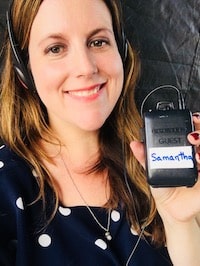
Samantha Herman
Samantha Herman was born and raised in Toronto, Canada, to Lesli and Robin Herman. During her childhood, she was exposed to television and films, both current and classic, and a lifelong fascination was created. Herman is the founder of Frankly, My Dead, a film industry business affairs and consulting firm.
She graduated from the University of Toronto with a Bachelor of Arts degree in English Literature (major), History (minor) and Film Studies (minor). Though she always wanted to participate in the entertainment industry, she decided to first go to law school in order to earn a relevant business and contracts background. To that end, she graduated cum laude from Loyola University Chicago School of Law in 2010.
After graduation, knowing that there was only one place to be for a blossoming filmmaker, she moved to Los Angeles. There, she endured the grueling California Bar exam, which she passed on her first attempt. She spent time working at a law firm before realizing her true passion was still calling.
She first collaborated on a short film in Los Angeles as the project’s Production Lawyer. Thereafter, she joined the production company, Landed Entertainments, full-time. With the company, she now continues as the Los Angeles office’s General Counsel. In addition, she works as a Producer for music videos, short films, and features. As a Writer, Samantha collaborates with her partner in comedy crime, her brother Jesse Herman. Her screenwriting credits include Angel Falls: A Novel Holiday and Mingle All the Way.
She is also the author of a romance novel.
Her film career has been mentioned/featured in BizWomen, Romper, The Varsity, ET Online, Voyage LA, Film Courage, Hallmarkies Podcast, and Broadway World.
References
- 1. "Entertainment Lawyer Salaries in United States". Glassdoor.com. published: Deceber 14, 2019. retrieved on:
